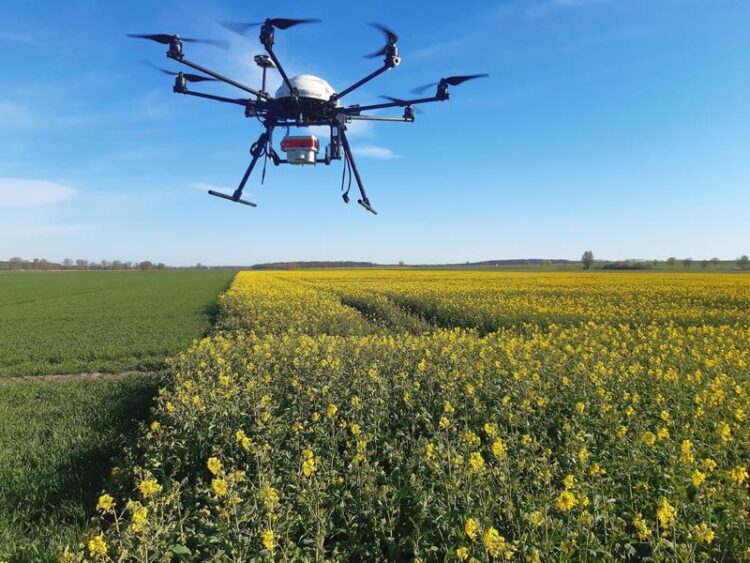Identifying future research gaps to achieve pesticide use reduction in Europe

Drones could help to apply crop protection products in a more precise manner in future.
Credit: Feistkorn / JKI
EU-Project FORTUNA:
The new European project, coordinated by JKI, points out how agronomic research supports the transformation of agriculture after 2030.
The main goal of the EU Farm-to-Fork Strategy is to reduce the overall use and risk of pesticides by 50 per cent by 2030. The Horizon Europe project ‘FORTUNA – Future Innovation for Pesticide Use Reduction in Agriculture’ is a three-year initiative that seeks to identify knowledge gaps and challenges in plant protection beyond 2030, highlighting the need for further research. The project will analyse the results of ongoing or completed national and European projects and applied research.

Group photograph of the international participants of the EU project FORTUNA. (c) JKI
The eleven FORTUNA partner organisations, together with stakeholders from the farming community and the value chain, will collect successful methods and strategies that have already been proven to reduce pesticide use and risks.
Silke Dachbrodt-Saaydeh from the Julius Kühn-Institute (JKI), who leads the FORTUNA project, explains that the participating scientists will identify both drivers and barriers through biological-ecological, technological, and socio-economic assessments. The JKI scientist explains that in addition to the reduction potential, the consortium is also analysing which adjustments to cropping systems are necessary for the methods to be effective in agro-ecological farming concepts and to promote biodiversity. The researchers will also be taking into account the challenges of climate change in the adaptation of farming systems. Based on the findings, future research needs will be identified and the strategic research and innovation agenda will be developed until 2026.
The FORTUNA consortium, led by the Institute for Strategies and Technology Assessment at the Julius Kühn-Institute, comprises eleven research institutions from nine European countries and Switzerland. The kick-off meeting was held on 6-7 February 2024 at the JKI Institute for Strategies and Technology Assessment in Kleinmachnow.
Project information
Duration: 01 January 2024 – 31 December 2026
Budget and funder : ~ €1 mn, HORIZON EUROPE
Coordination: JKI, Institute for Strategies and Technology Assessment
Cooperation partners:
Leibniz-Zentrum für Agrarlandschaftsforschung (ZALF) e.V. (Deutschland), Aarhus Universitet (Dänemark), National Research Institute for Agriculture, Food and the Environment (INRAE; Frankreich), Scuola Superiore di Studi Universitari e di Perfezionamento Sant’Anna (Italien), Sveriges Lantbruksuniversitet (Schweden), Ökológiai Mezőgazdasági Kutatóintézet Közhasznú (ÖMKi; Ungarn), Arcadia International E.E.I.G. (Frankreich), Association de coordination Technique Agricole (ACTA; Frankreich), Agricultural University of Athens (Griechenland), Agroscope (Schweiz), Gemeinschaft zur Förderung von Pflanzeninnovation e. V. (GFPi)
Wissenschaftliche Ansprechpartner:
Silke Dachbrodt-Saaydeh
Tel.: + 49 03946 47-5290
Mail: silke.dachbrodt-saaydeh@julius-kuehn.de
Media Contact
All latest news from the category: Agricultural and Forestry Science
Newest articles
Faster, more energy-efficient way to manufacture an industrially important chemical
Zirconium combined with silicon nitride enhances the conversion of propane — present in natural gas — needed to create in-demand plastic, polypropylene. Polypropylene is a common type of plastic found…

Energy planning in Ghana as a role model for the world
Improving the resilience of energy systems in the Global South. What criteria should we use to better plan for resilient energy systems? How do socio-economic, technical and climate change related…

Artificial blood vessels could improve heart bypass outcomes
Artificial blood vessels could improve heart bypass outcomes. 3D-printed blood vessels, which closely mimic the properties of human veins, could transform the treatment of cardiovascular diseases. Strong, flexible, gel-like tubes…





















